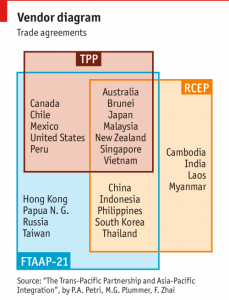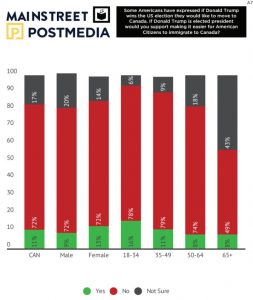Will Trump Launch a Trade War with China?
President-elect Trump is a media whiz and a master of rhetoric and demagoguery who has captivated those under-educated predominately WASP (and Catholic) blue collars and rural rednecks who perceive themselves as losing out in the race against workers in other countries coupled with the onslaught of technology. One mantra that he has successfully drilled into their tiny and narrow minds is that “China is raping America” through unfair trade practices such as manipulating its currency, outwitting US officials at the negotiating table, or unfairly undercutting US competition by subsidizing exports, among numerous other charges.
Two and a half weeks before his election, Trump unveiled his “100-day plan to Make America Great Again”. Apart from pledging to turn Washington upside down and inside out, he set his administration’s agenda on trade, energy, climate change, security and immigration. Of particular interest is the seven priorities for “protect(ing)” American workers, the first four of which deals with trade. First, he would renegotiate the North America Free Trade Agreement (NAFTA) with Canada and Mexico; and failing that, would withdraw from it under Article 2205. Then, he promised to renounce Obama’s Trans-Pacific Partnership (TPP) framework (that excludes China); after which he would label China a currency manipulator, and finally “identify all foreign trading abuses that unfairly impact American workers” and take all measures to halt them and punish the perpetrators.
First, let’s look at NAFTA under which all three countries have reaped enormous benefits in terms of jobs, trade, and investment. Asked about the prospect of renegotiations for the two-decade old agreement by NPR, Eswar Prasad, a renowned trade and currency economist at Cornell University opined that doing that “would not be a trivial matter”. Changing it would hurt many US businesses and farmers that are dependent on well-established supply chains and distribution systems based on the agreement. Nonetheless, Trump could make life very difficult for businesses doing cross-border trade by using his administration’s enforcement mechanisms. So, while NAFTA would live on in name, it would be gravely injured if not on its deathbed in spirit, Mr Prasad underscored.
TPP, a key pillar of the Obama Administration’s ‘pivot’ to Asia, has yet to be ratified by the US Congress. President-elect Trump’s condemnation of the pact as a “disaster” plus that this time around the Republicans control both the House and the Senate, not to mention maintaining a big majority among state governors, has ensured that the agreement is dead-in-the-water. In fact, a former economic advisor to Vice-President Biden most recently Twittered the Obama government has given up on a lame-duck vote on it. Meanwhile, the China-led Regional Comprehensive Economic Partnership (RCEP) negotiations are forging full-speed ahead that encompasses more than 3 billion people inhabiting China, India, ASEAN, Japan, South Korea, Australia, and New Zealand. In a mirror image of TPP, the US is not included in the talks.
Trump made ‘China-bashing’ a hallmark of his campaign and he has pledged to call China out as a currency manipulator. In addition, his campaign manifesto called for an end to China’s “illegal export subsidies”, lax labour laws, and ineffectual environmental standards, promising to “cut a better deal with China that helps American businesses ad workers compete”. Claiming China keeps the RMB artificially low to boost its exports, Trump has threatened “appropriate countervailing duties on artificially cheap Chinese products” to the tune of as much as 45% (along with 35% on Mexican products). The American government has not designated China a currency manipulator since the Clinton Administration in 1994 and both the Bush junior and Obama Administrations refrained from doing so.
Trump has seesawed on the issue during the campaign though. In a Republican candidate debate back in March, he clarified that his statement on anti-China tariffs was merely a threat. “The 45% is a threat that if they don’t behave, if they don’t follow the rules and regulations so that we can have it equal on both sides, we will tax you”, he explained. And when asked about the high probability for igniting a trade war, Trump cavalierly retorted, “who the hell cares?”
But, will Trump follow through with his threat after all? If he does, the ramifications for both economies will be devastating indeed. In a September report, the pro-trade Washington-based Peterson Institute for International Economics stated a trade war with China would shock the US economy back into a recession and cost as many as 4 million private sector jobs nationwide, hitting lower-income and lower-skilled workers disproportionately more, the very constituents that voted in force for him. In a related report the Institute modelled that regionally, specifically California, could lose 640,000 jobs by 2019 with Los Angeles hardest hit losing 176,000 jobs.
Capital goods industries would be worst affected that would strongly ripple throughout the economy, erasing jobs in retail, restaurants, and temporary employment agencies. Chinese tit for tat retaliation would be a certainty. By simply instructing its state-owned enterprises to cease buying US company services, for instance, California could lose almost 14,000 high-end jobs, with nearly 6,000 lost in LA and Orange counties alone. If China put purchases of American aircraft on hold, the entire region would experience additional job losses. It is interesting to note that the last time the US erected protectionist barriers against foreign imports back in the 1930s, they exacerbated and prolonged the Great Depression.
Yet, some analysts believe Trump may take some action, if not a full-powered 45% tariff. In a note to clients, Wei Tao, a China specialist at Societe Generale wrote a high tariff is out of the question but a watered-down tariff of 15% (and a lesser one for Mexico) is entirely possible. A 45% tariff would be ruinous for China’s exports to the US. In a note, Kevin Lai, an analyst with Daiwa Capital Markets estimated Chinese exports bound for the US could plummet by an astounding 87% or $420 billion whereas a 15% tax would see Chinese exports fall by 31% that could cut 1.75% off China’s GDP. But, because it is a key driver of the world economy, a trade-battered China would produce tremendously negative repercussions across the globe that is already witnessing weak demand and eventually rebound squarely on the US.
So, will Trump resort to ‘cutting off the nose to spite the face’? The world will be watching with nervous anticipation over the initial months of his administration.
Will China Lead on Climate Change Due to Trump?
The question for Trump may be who he wants to lead the world on climate change: the U.S., or China?
While it will take time — possibly the entire Trump presidency — to roll back many Obama’s climate achievements, make no mistake: It will become much harder for the world to meet its climate goals with Trump in the White House.
This fact could have ramifications lasting decades or more as the planet responds to increased greenhouse gases in the air.
However, there is reason to be optimistic: global energy trends are moving in favor of renewables over coal and other fossil fuels. The worldwide push toward solving global warming that occurred during Obama’s presidency has gained enough momentum that it is not going to stop even if the U.S. turns into a rogue state on this issue.
“A shift to a low carbon economy,” says Mark Watts, the executive director of the C40 Cities Climate Leadership Group, “is too well-embedded in large parts of the world, particularly China, for it to be overturned.”
China, in fact, reiterated on Friday that with or without the U.S., it is firmly committed to continuing to reduce its emissions.
“Our policies and action will not be impacted by any action by the U.S. government,” Chen Zhihua, of China’s National Development and Reform Commission, said at the latest round of UN climate talks in Morocco on Monday.
– Mashable
Pubertal Antics of Hong Kong Separatist Legislators

A pro-China protester carries a printout depicting newly elected Hong Kong lawmaker Sixtus Leung representing a traitor during a demonstration outside the Legislative Council in Hong Kong Wednesday, Oct. 26, 2016. More unruly scenes erupted in Hong Kong?s legislature Wednesday as two newly elected lawmakers defied an order barring them from retaking their oaths after being disqualified earlier for insulting China. (AP Photo/Kin Cheung)
Three weeks ago, several radical separatist ‘Localist’ legislators recently elected to Hong Kong’s Legislative Council (LegCo) put on a pubertal show of utter contempt for the Hong Kong SAR and the mainland.
Youthful would-be legislators Yau Wai-ching and Sixtus “Baggio” Leung altered their parliamentary oaths to uphold Hong Kong’s Basic Law with Lau saying she “(bore) true allegiance to the Hong Kong nation”. When told to repeat the oath correctly, she resorted to abusing the name of the People’s Republic using foul words and a derogatory war-time Japanese term for China ‘Chee-na”. Not to be out done, Sixtus Leung draped a banner declaring “Hong Kong is NOT China” and again uttered the disparaging word ‘Chee-na’. Lau Siu-lai read her pledge in slow motion, taking 10 minutes to finish the 77-word oath while other pro-secessionists tore up prop copies of the Basic Law.
In the face of such an dispicable affront to Hong Kong dignity and Chinese sovereignty, China’s National People’s Congress (NPC) took the unprecedented step of blocking Ms Yau and Mr Leung from taking their oaths a second time after being initially disqualified by the LegCo President. The NPC issued an interpretation of a section of the Basic Law on oaths sworn by incoming legislators. Li Fei, deputy secretary-general of the NPC Standing committee told reporters at a subsequent Beijing news conference, “breaking ‘One Country, Two Systems’ is violating the law, not voicing a political view…There will be no leniency (for the perpetrators)”.
Lau and Leung exemplify a new breed of radicalized Hong Kong youths who see little hope for their future just as their mainland cousins enjoy continuing improvements in their daily lives and China as a country leapfrogs over other countries in almost every facet of economy, society, and even politics. As a pro-Localist journalist wrote in hkej.com last February, “(There is) a growing sense of hopelessness engulfing Hong Kong people”. Dissatisfaction with their economic plight easily translates into grievances against the Hong Kong government and the existing process for electoral democracy in the enclave.
Especially in the wake of the “Occupy Central” demonstrations that brought key thoroughfares and districts in Hong Kong to a standstill in 2014, groups with Localist sympathies have since galvanized into political parties dedicated to full-fledged Hong Kong independence either now or in the post ‘One Country, Two Systems’ world after 2047. They include Hong Kong Indigenous, Hong Kong National Party, and Youngspiration with the latter and Demosisto, another radical grouping, calling for a referendum on independence after “One Country, Two Systems” ends. Still others advocate a return to British rule such as the Hong Kong Independence Party and the Alliance of Resuming British Sovereignty over Hong Kong and Independence.
But, these groups represent an extremist fringe of the populace. A survey conducted by the Chinese University of Hong Kong (CUHK) over the summer showed only 17.4% of respondents sympathetic to the prospect of becoming independent after 2047 and a mere 3.6% stating that independence is “possible”. Opponents of Hong Kong independence cite several reasons for the improbability of actual secession: For one thing, Article I of the Basic Law stipulates Hong Kong is an inalienable part of China and so advocacies for independence have no legal basis. Second, Most Hong Kongers trace their ancestry and kinship to the mainland not to mention sharing language and culture. Nathan Law Kwun-chung of Demosisto and Edward Leung of Hong Kong Indigenous, for instance, were both born on the mainland.
In practical terms, devoid of any major natural resources, Hong Kong is overwhelmingly dependent on the mainland for the basic necessities of life – food, water and electricity. In fact, the produce and meats that Hong Kongers consume are some of the most premium products exported from neighbouring Guangdong and other provinces. In terms of economic growth, Hong Kong benefits immensely from its close association with Shenzhen across the border and other manufacturing and high-tech hubs in the Pearl River Delta. The mainland is Hong Kong’s largest trading partner and thus crucial to Hong Kong’s continued prosperity. As China gradually supplants the US as the global superpower, movements to distance Hong Kong from the mainland can only be folly.
Most important, with memories of the Century of Humiliation still fresh in the minds of the Chinese people, no central Chinese government, whether Communist or of any other ilk, can/will tolerate any moves toward secessionism on the part of Taiwan, Hong Kong, Tibet or Xinjiang. In Hong Kong’s case, a People’s Liberation Army (PLA) garrison is stationed in the heart of the city. You can be sure with the mainland’s growing political wisdom and economic might coupled with military strength and prowess, any armed rebellion, let alone referenda, for formal Hong Kong independence will be put down with prejudice.
Canadian Immigration Website Crashes After Trump Win
As election night results showed a win for Donald Trump, nervous Americans considering an exit strategy apparently crashed Canada’s immigration website. The site has been working intermittently throughout the night with high levels of traffic.
Canadian Prime Minister Justin Trudeau entertained the idea of welcoming Americans fleeing a Trump presidency in March. But, Canadians are not keen on the idea.
A poll released Tuesday shows the overwhelming majority of the nation is opposed to easing immigration policies in the event of a Trump victory. The poll, conducted by Mainstreet Research and Postmedia Network Inc., also reveals that most Canadians would support Clinton for U.S. president.
“This election has been quite divisive south of the border and many Canadians are anxious about the outcome on Tuesday,” said Quito Maggi, president of Mainstreet Research.
– Huffington Post



